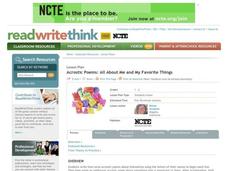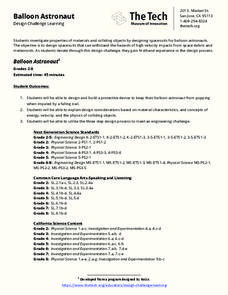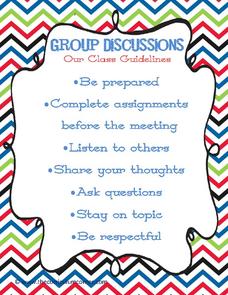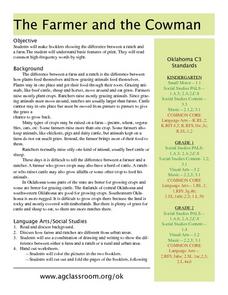National Council of Teachers of English
A Bear of a Poem: Composing and Performing Found Poetry
Scholars work collaboratively to compose a found poem from one of their favorite stories. With a finished product in hand, class members form a circle and perform their work for an audience by taking turns reciting one line till the poem...
National Council of Teachers of English
Acrostic Poems: All About Me and My Favorite Things
Budding poets create two acrostic poems, one for their name and another using a word of their choice. Over the course of five days, scholars compose, revise, publish, and share their work with their peers.
Harper Collins
The Giving Tree Anniversary Teaching Guide
Celebrate poetry month all of April with a guide that uses six of Shel Silverstein's most famous books as a basis for the lessons. Discussion questions and writing activities are provided for each of Silverstein's books.
Tech Museum of Innovation
Balloon Astronaut
Design protection from high-speed particles. The STEM lesson plan highlights why astronauts need protection from space debris. Pupils use the design process to design, build, and test a spacesuit that will protect a balloon from a...
Curated OER
Learning Life Lessons through Fables
Explore a variety of fables to learn life's lessons through engaging stories. Add rigor to the learning process with activities that include matching a a fable to the story's moral, short answer exit slips, and a three-column graphic...
Northern Ireland Curriculum
Feeling Good, Feeling Sad
Fill your classroom with grand conversations about emotions and the healthy ways to express them. Your scholars will create a collage, play a feelings game, read stories, and reflect on their daily feelings.
Agriculture in the Classroom
Seed Match
Using this resource, your team of green thumbs discuss why plants are a part of a healthy diet and the different ways they are used in daily life. They then observe the characteristics of different seed as they attempt to match them with...
Center for Civic Education
What Is Authority?
Young scholars examine the concepts of power and authority as they begin learning about government in this elementary social studies lesson. Through a series of readings, discussions, and problem solving activities, children learn about...
Berkshire Museum
Meet a Naturalist: Researching, Writing, Interviewing
Young scholars reach out into the community and learn about different environmental science careers in this inquiry-based instructional activity. Beginning with a short research assignment, children gain background knowledge about...
Curriculum Corner
Helping Students Learn to Collaborate
Keep this attractive display up on your walls to refer to each time you ask your learners to engage in a group discussion. The printable reminds participants to come prepared, complete assignments before meeting, listen and share ideas,...
Baylor College
Need or Want?
Even as adults it can be hard to distinguish needs from wants. Using pictures of common, everyday items, children make a pocket chart separating the objects they need from those that they want. Discuss their choices, explaining that...
Baylor College
Needs of Living Things: Pre-Assessment
Determine your class's prior knowledge about the necessities of life with this pre-assessment for a unit on living things. Learners draw pictures of themselves with all the things they need to live, grow, and survive. These drawings will...
Baylor College
What's That Food?
Get things cooking with the first lesson in this series on the science of food. Working in small groups, young scientists make and record observations about different mystery foods. These descriptions are then shared with the class and...
California Academy of Science
Tropical Belt
Where in the world is the equator? Explore a world map with your class, coloring in oceans, continents, and rainforests while locating the three major lines of latitude: the equator, Tropic of Cancer, and Tropic of Capricorn. Discuss how...
California Academy of Science
Be Prepared for an Earthquake
Earthquakes can be frightening and dangerous, but being prepared can make a world of difference. Perform an earthquake simulation during which the class practices how to drop, cover, and hold on as you read a script describing what might...
Curated OER
Lesson 3: Idioms
You're as cute as a bug. But are you really as cute as a bug? Bugs aren't cute! Idioms are fun nonliteral phrases that mean something different than the words they contain. Second graders learn about idioms as they read the book, More...
Curated OER
Using Compare and Contrast Key Words
Compare and contrast while challenging your class with this higher-level thinking and reading comprehension lesson. After observing the teacher model comparing and contrasting bats and birds, learners read passages about two towns. They...
Curated OER
Compliments and Feelings
How do you feel when you get a compliment? Give a compliment? After modeling how to make explicit compliments (“I like the way . . .”) ask class members to practice saying nice things about themselves and others, and to consider how...
Curated OER
Cause and Effect Relationships
Cause and effect relationships can be found in life and in literature. Enthusiastic readers will find and discuss all of the cause and effect relationships in the story, Alexander and the Terrible, Horrible, No Good, Very Bad Day. The...
Curated OER
Distinguish Fact from Opinion in Passage
Is it a fact or is it an opinion; readers need to know. Second graders learn a new technique to determine if a sentence or reading passage is fact based or opinion based. They read and then ask evidence based questions to determine if...
Alabama Learning Exchange
The Moon
Young scholars explore the phases of the moon. In this solar system lesson plan, students listen to several books about the moon including The Moon Book by Gail Gibbons. Young scholars complete a KWL activity concerning the phases of the...
Curated OER
The Farmer and the Cowman
What is the difference between a ranch and a farm? After reading and discussing the provided background information, young agriculturalists will color, cut, and create neat little booklets that show the differences between ranches and...
Common Sense Media
ABC Searching
Learners explore English by completing an interactive computer activity. In this alphabet lesson, students research the Internet to create a picture dictionary which they share with classmates. Learners locate digital images of words...
Curated OER
Lesson 3: Encyclopedias
After being introduced to non-fiction texts, second graders meet a different type of non-fiction text that can help them locate factual information. They discuss and examine all of the features found in typical encyclopedias such as,...

























